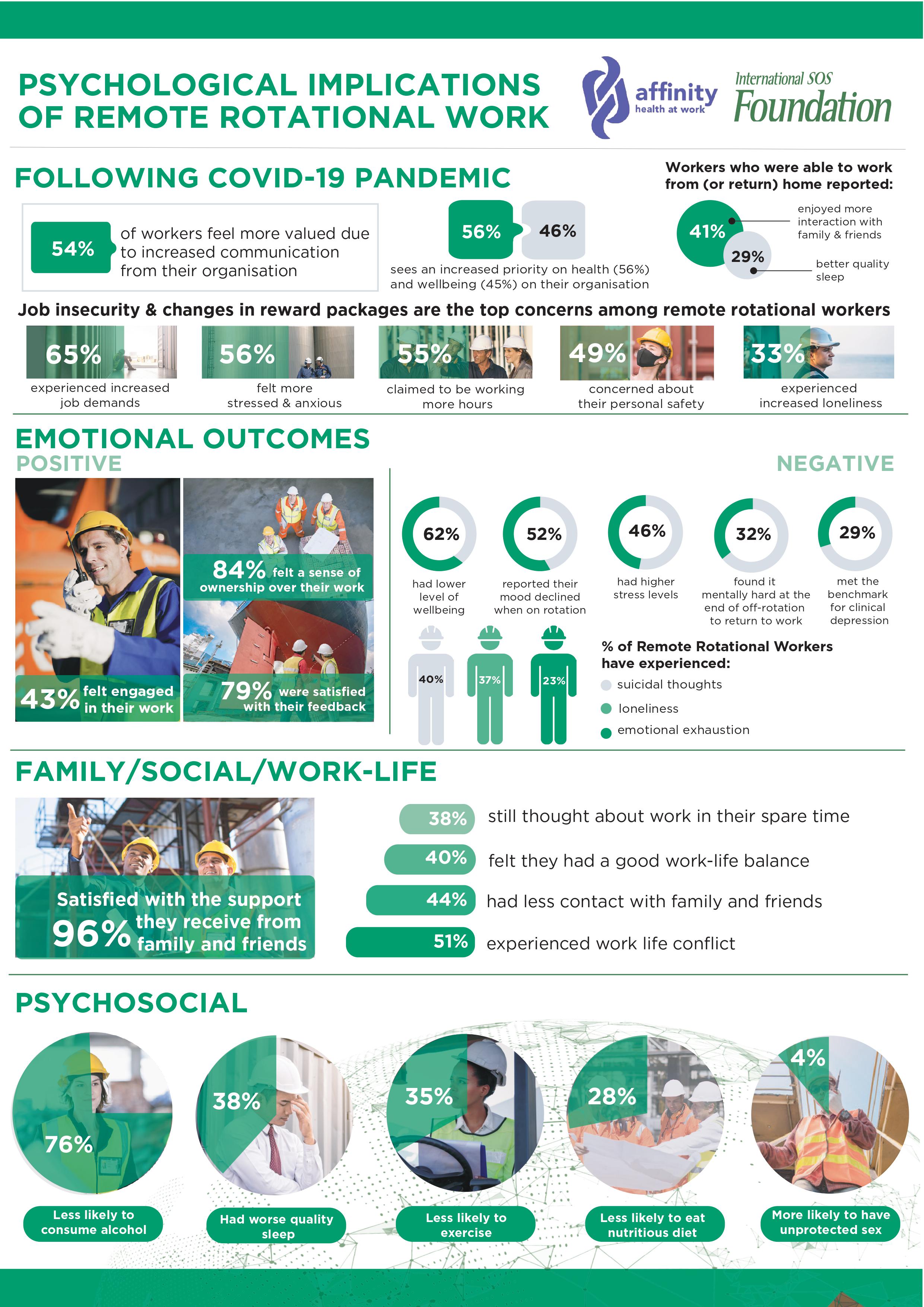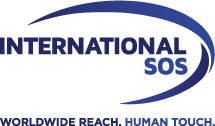Ground-breaking global study unveils the mental health minefield of the remote rotational workforce
Whether on or offshore, the work and lifestyle of a remote rotational worker is unique. While lucrative for some, it has long been associated with a high impact on mental health and wellbeing. A ground-breaking global report from the International SOS Foundation and Affinity Health at Work, ‘Mental Health and the Remote Rotational Workforce’, provides in depth insight into the psychological impacts of this unique mode of working. The new study1 highlights evidence of the high level of suicidal thoughts, clinical depression, impacts on physical health (such as diet) and the impact of the COVID-19 pandemic on this workforce.
Dr Rodrigo Rodriguez-Fernandez, Medical Director Wellness and NCD’s, International SOS, commented, “There is an urgent need for increased focus, understanding and strategies to mitigate mental ill health and promote better metal health of the remote rotational workforce. This is highlighted in our survey, which uncovers significantly high levels of critical mental ill health issues, including suicidal thoughts and depression. The COVID-19 environment has also added increased stress on this already pressured working arrangement.”
Key study findings:
- 40% of all respondents experienced suicidal thoughts on rotation some or all the time (compared to average of 4-9%). 1 in 5 are feeling suicidal all or most of the time.
- 29% met the benchmark for clinical depression whilst on-rotation.
- 52% reported a decline in mood, and their mental health suffered whilst on rotation.
- 62% had worse mental health than would be the norm in a population. While off rotation, this remains at a high of 31% experiencing lower mental health than the general population.
Burn Out
The study also exposed that almost a quarter (23%) of the remote rotational workers surveyed experienced emotional exhaustion on a weekly basis. 46% experienced higher stress levels while on rotation and over half (57%) were not engaged in their work. 23% reported that they received no psychological support from their employers.
Dr Rachel Lewis commented, “We would expect burn out to be between 2-13% in the general population, so the almost quarter that we see from the survey is particularly high. Burn out can have a serious impact both personally and professionally, on the ability of an individual to carry out their role. Remote rotational work may come with the perks of higher pay, but with its propensity to be isolating at the best of times. On and offshore, working pressures and varying shift patterns also add their weight. And this is not to mention the impact of the current pandemic, which has seen may remote workers unexpectedly away from family and friend networks for longer than anticipated.”
Impacts of the COVID-19 pandemic
- 65% experienced increased job demands.
- 56% increased working hours stress, anxiety
- 49% concerned for personal safety (before pandemic?)
- 1/3 became increasingly lonely
- 23% had more negative physical symptoms (such as headaches and stomach issues)
The Tip of the Iceberg
Dr Rodriguez-Fernandez continues, “Mental and physical health are intrinsically linked. Organisations and individuals with a Duty of Care to their remote rotational workers should have visibility and a plan of support for their workforce encompassing both.”
- Over a third exercised less (35%)
- 38% experienced worse-quality sleep (38%)
- Over a quarter (28%) were less able to eat a nutritious diet whilst working
On the flipside, the majority of respondents felt that their health and safety was prioritised. They report a strong sense of community and support among co-workers and from managers. Many also felt that they could share their mental health concerns with colleagues.
The full report, including practical recommendations on mitigation measures for companies is now available here. A live webinar on the findings is also taking place on 29 April 2021.
To download the infographic, click here.
1. ‘Mental Health and the Remote Rotational Worker’ synthesizes global data, including interviews with industry stakeholders, an extensive review of existing literature and an in-depth survey of 200 remote rotational workers. The respondents were from mining, offshore and seafaring/maritime based in; 59% Asia,15% Middle East, North Africa,15% Africa, 3% Europe, 3% APAC (Australia, New Zealand and Papua New Guinea), 5% Americas. 46% categorised themselves as employees, 33% managers and 21% did not categorise. 81% male. Average age of 41 years. 70% of respondents were married. 95% had no history of, or current diagnosis, of any psychological issues.
For further information contact:
Suzanne Withers, Head of Group PR, International SOS
T: +44 (0) 208 762 8494, M: +44 (0)7584 522 497
E: suzanne.withers@internationalsos.com
Notes to Editors
About the International SOS Group of Companies
The International SOS Group of Companies is in the business of saving lives, protecting your global workforce from health and security threats. Wherever you are, we deliver customised health, security risk management and wellbeing solutions to fuel your growth and productivity. In the event of extreme weather, an epidemic or a security incident, we provide an immediate response providing peace of mind. Our innovative technology and medical and security expertise focus on prevention, offering real-time, actionable insights and on-the-ground quality delivery. We help protect your people, your organisation's reputation, as well as support your compliance reporting needs. By partnering with us, organisations can fulfil their Duty of Care responsibilities, while empowering business resilience, continuity and sustainability.
Founded in 1985, the International SOS Group, headquartered in London & Singapore, is trusted by 12,000 organisations, including the majority of the Fortune 500, as well as mid-size enterprises, governments, educational institutions and NGOs. 12,000 multicultural medical, security and logistics experts stand with you to provide support & assistance from over 1,000 locations in 90 countries, 24/7, 365 days.
To protect your workforce, we are at your fingertips: www.internationalsos.com



